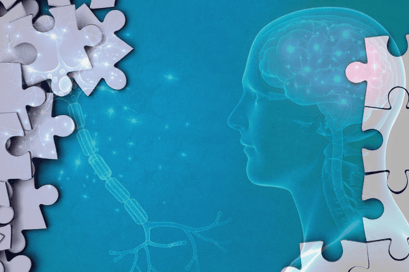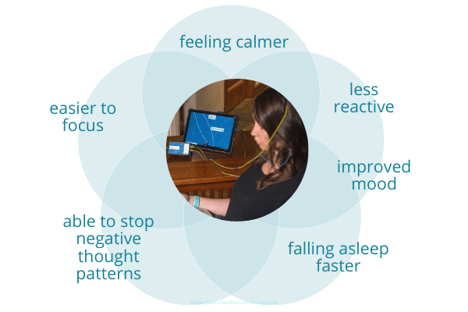Keep Your Brain Sharp - Best Brain Training Tools for Anti-Aging
Discover the benefits of anti-aging brain training tools on our blog. Learn how neurofeedback can help optimize brain function as you age.
Improve your cognitive abilities with the best brain training tools. Visit our blog to discover the latest research and techniques.
Brain training is a new and expanding field and consumers are rightfully wondering which products are worth their time, effort, and investment. Research is growing, and every week we have more information on what works and what doesn't.
Brain training refers to everything that aims to optimize your brain health, from basic brain training apps to sophisticated neurofeedback systems. At my brain training center, I advise clients to avoid diving into specific tools without first assessing their needs and the options. The key to success is having goals, and understanding how different brain training options can help you achieve them. Whether your goals are overall wellness, peak performance, mood improvements, or cognitive fitness, finding the right brain training program is essential.
 You may think you already know the answer to this question: training your brain! But, what exactly can we train it to do? Many people think brain training is limited to enhancing cognitive function. But this definition merely reflects the current fad around brain training apps and games. The actual potential of brain training lies far beyond simple mental tasks, such as improving memory or motor skills.
You may think you already know the answer to this question: training your brain! But, what exactly can we train it to do? Many people think brain training is limited to enhancing cognitive function. But this definition merely reflects the current fad around brain training apps and games. The actual potential of brain training lies far beyond simple mental tasks, such as improving memory or motor skills.
An improved definition of brain training is any activity that facilitates enhanced brain performance. This includes performance in areas under conscious control, such as concentration and problem solving agility; as well as unconscious functions, such as stress response, sleep quality, and long-term health.
Brain training developed from fairly recent discoveries. It is only within the last 30 years that researchers established that the brain is not a fixed system. Research demonstrates that our brains have the capacity for life-long growth, improvement and even repair.
When I studied neuropsychology in the early 90s, I was taught the now outdated fixed-system model. In that view, a broken or injured brain could not be fixed. For example, if a person suffered a stroke and had damage to the brain's language center, that damage was considered permanent. But current research says that model is flawed. They essentially discovered the world is round, after believing it was flat! We now know the brain is not static, it is dynamic.
This new information allows us to unlock the potential for healing and growth. Research shows the brain is able to re-wire itself to improve its functioning, and even re-locate functioning to a new area when one region becomes permanently-damaged. The formal term for this ability to adapt and change is neuroplasticity. Not only can the brain learn new things, but learning and other processes can alter the brain's physical structure.

"Neurons that fire together, wire together."
This phrase was coined by Canadian neuropsychologist, Donald Hebb, a leading researcher in the field of associative learning. His work showed how neural networks are formed through the repetition of behaviors. In the field of positive psychology, researchers have recently applied Hebb's principle to discover that brain training can re-wire our brains to reduce stress, improve our overall mood, wellness and effectiveness.
Let's take a look at all the ways you can benefit from brain training techniques. Here are some of the areas you can positively impact through brain training:

Cognitive Performance / Executive Functioning. Whether you want to improve your grades, keep your mind sharp as you age, or improve executive functioning at work, brain training is a great way to maintain or improve cognitive performance. This includes: length and quality of focusing, working memory and word recall, mental clarity, and the ability to organize ones thoughts.
Emotional Well-Being. After cognitive improvement, the most common goal for brain training is improvement in mood. Some people are looking to decrease their stress and worry, others are looking to feel more uplifted, happy and hopeful. Still others aim to maintain a calm state and not experience the highs and lows of mood swings. Watch our free webinar on self-regulation.
Peak Performance / Creating Flow States. People who want to perform at the peak of their abilities, whether it is in athletics or emotional communication, or who want to rank best in their professional field engage in brain training to heighten both cognitive skills and emotional regulation. Tom Brady, who won his eighth Super Bowl title at the age of 41, has attributed his prolonged athletic performance to various forms of brain training. His book, The TB12 Method, is about his use of various brain training tools to stay on top of his game.

Sleep Management. It is widely accepted that the the right amount of high-quality sleep supports emotional regulation and cognitive functioning. Good sleep is also correlated with fewer illness as we age. Engaging in brain training activities promotes healthy sleep, and subsequently boosts overall health. If you are someone who struggles with getting high quality sleep, you might consider brain training as part of your sleep management routine. Read our article on how to fix sleep deprivation.
This is by no means an exhaustive list of how wellness that can be positively impacted through brain training. You can learn more about the benefits of brain training here.
Understanding the benefits of brain training is vital for choosing a program that aligns with your goals. However, if you are not familiar with the field, it may not be clear what is meant by the terms executive functioning and peak performance.
An important area of the brain, called the frontal lobe, controls executive functions. Executive functions include many skills that we associate with responsibility, such as memory, organization, and the ability to plan ahead and consider consequences. Developing executive functions allows for greater cognitive performance while executing tasks--in other words, executive functions allow us to think before we act.
Brain training promotes the development of executive functioning by stimulating core skills, such as emotional regulation and stress response. When our brains are not properly trained, we rely more heavily on instinctive responses, known as fight, flight or freeze. While these instincts are important when we are actually in danger, they often hinder us in non-threatening situations, such as tests or presentations.
Executive functions counter our natural urge to fight, flee or freeze. They allow us to think rationally and problem-solve, which helps us complete necessary tasks with more ease. Because executive functions are crucial at school and in the work place, this is often an area people seek to improve through brain training.
Peak performance, also called flow state, is the official term used to describe feeling "in the zone". When we are in this state of mind, activities feel natural and effortless.
People often talk about professional sports players being in the zone when they are competing, but anyone can experience peak performance during any activity. For example, someone might hit peak performance while they are giving a presentation. Another person may experience this while baking. Yet another person might reach a flow state while writing a paper.
Regardless of the activity, people experiencing peak performance report the feelings of effortlessness. They are neither too bored, nor too challenged by the activity. More importantly, they are not overthinking or worrying about their performance. The key to achieving a flow state is being calm and confident. This is where brain training can help.
Brain training encourages calm and centered states. Oftentimes, we are fully prepared to take on the tasks ahead, but fail to deliver because we are nervous or stressed. This is often referred to as performance anxiety. When we train our brains to calm down and stay centered, we put ourselves in a position to achieve peak performance. This allows us to optimize our abilities and reach our full capacities.
Reaching peak performance is often a goal for athletes and students, and can also benefit those facing long or strenuous work days.
Now that we've discussed what benefits brain training provides, let's discuss what types of brain trainings are available.
Choosing the right brain training program depends on your goals. The best brain training may be an app or device, but it might also be something less concrete, like learning a new behavior or re-training how you talk to yourself. Some of the interventions are still too new to show conclusive benefits, but here are some of the most accessible brain training techniques and apps, and how they have been evaluated up to now.
Brain Training Apps can help with anti-aging, mental acuity and memory recall. These can be found in the app store on your smart phone. They all work similarly, offering mini-games that are designed to improve performance of various cognitive skills, such as memory and mental agility. Scores are stored, and the user can track their improvement over time. One study showed that a brain training app used by elderly participants slowed their cognitive decline. Some of the most popular apps are Peak, Elevate and Luminosity.
Exercise increases oxygen flow to the brain and stimulates brain function. Interval training is shown to improve cognitive functioning and is a proven support for improving your mood and sleep. A new study shows that aerobic exercise can also improve executive functioning.

Diet has well-researched effects on brain functioning. Many studies have shown that diets high in sugar correlate with lower functioning because your gut produces the mood-regulator serotonin. Other studies show that foods that create inflammation are bad for brain functioning. But foods that are high in nutrients that the brain uses to build neurons and neurotransmitters can have positive effects. What you eat is an important aspect of maintaining brain health.
 Neurofeedback devices use precisely timed feedback to help the brain regulate itself. Using brain wave measurements collected through EEG or fMRI technology, brain patterns are consciously or automatically fed back to the individual. That feedback is used to improve functioning and re-wire the brain. There are a lot of devices that call themselves neurofeedback. It is important to stay up-to-date on the best neurofeedback equipment. Neurofeedback has a range of benefits, including increasing cognitive functioning/focus, executive functioning, memory, emotional regulation, sleep management and peak performance.
Neurofeedback devices use precisely timed feedback to help the brain regulate itself. Using brain wave measurements collected through EEG or fMRI technology, brain patterns are consciously or automatically fed back to the individual. That feedback is used to improve functioning and re-wire the brain. There are a lot of devices that call themselves neurofeedback. It is important to stay up-to-date on the best neurofeedback equipment. Neurofeedback has a range of benefits, including increasing cognitive functioning/focus, executive functioning, memory, emotional regulation, sleep management and peak performance.
Micro-current stimulation neurofeedback or neurostimulators This is a new area of training where micro-currents of electricity force an electrical pattern change in the brain. This influences the neural pathways and cause an emotional state shift. Micro-current products are looking to impact the stress response patterns that create PTSD. There is not enough research to judge the effectiveness of this new brain training technique.
Journaling can train the brain to focus on topics that need our attention and build awareness. It can also be used to let go of negative emotions. One study showed that writing down stressful thoughts and then throwing the paper in the garbage helps reduce stress. Similarly, Julia Cameron suggests a practice she calls "morning pages" in her best selling book, The Artist's Way. The practice is simple: Write three pages using the "free-thought" technique every morning. You don't need to edit or even read what you write. Creative people swear by it, including Elizabeth Gilbert, author of Eat, Pray, Love.

Meditation is proven to reduce stress and increase focus. Mindfulness meditation research is growing. The positive correlation between meditation and improved cognitive functioning is well-established. Practicing meditation for a few minutes a day can produce enormous health benefits. Watch also this video on neurofeedback and meditation.
Gratitude Practice stabilizes and uplifts moods. Positive psychology is growing field, and there are more and more studies looking at practices that impact our mental health. One study showed that writing letters expressing gratitude had a positive impact on participants' moods for months to come. Read also our blog on gratitude.
Playing a Musical Instrument Research has shown that both playing an instrument as a child, as well learning a new instrument as an adult has a positive impact on cognitive functioning. This is because playing an instrument activates both hemispheres of the brain. Another study showed that playing an instrument throughout one's life is correlated a slower rate of aging. It is theorized that playing an instrument acts as a protective mechanism to preserve cognitive abilities as one ages.
As you can see from the list above, there are a lot of different tools for brain training. Deciding which one will work for you depends on your goals. Pick one or two tools to start with and create a schedule for yourself. The more consistent you are, the better the results will be. Once you have a routine, you can add more tools to your brain training. The more tools you use, the more you will see changes in your quality of thinking and feeling. The most important rule to follow: never give up on yourself. Every day is a new opportunity to start fresh.
Natalie Baker has over 25 years of experience as a licensed psychotherapist and has been a NeurOptimal® neurofeedback trainer since 2011. She is the founder of Neurofeedback Training Co., which offers in-person sessions and runs the largest nationwide home rental program for NeurOptimal systems. Natalie also teaches meditation and Buddhist psychology and specializes in working with anxiety, stress, ADHD, and trauma.
Discover the benefits of anti-aging brain training tools on our blog. Learn how neurofeedback can help optimize brain function as you age.
Learn about the best practices to train the brain in New York City that boost cognitive and emotional fitness, reduce stress, and promote healthy...
How does the brain respond to stress? Learn about the stress response 3 stages and helpful stress management tools such as self-awareness &...
Be the first to know about new blogs